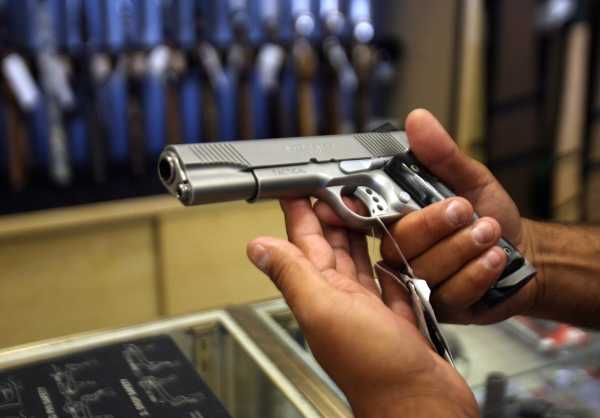
The federal background check system is supposed to keep guns out of the hands of people who shouldn’t have access to such deadly weapons. But the federal system has long been mired by gaps and loopholes — and according to a new report by Joshua Eaton for ThinkProgress, one of those loopholes appears to be getting worse.
Under federal law, the great majority of checks are completed with few problems. But a small few are deemed inconclusive, at which point the FBI can ask for three business days to complete a check. If the FBI doesn’t complete those background checks within three business days — maybe it can’t get the right information in time, or maybe a report takes too long to fax to the FBI — then the would-be buyer is allowed to purchase a gun despite not completing a background check.
According to ThinkProgress, the FBI failed to complete background checks within three business days in about 3.59 percent of the more than 8.6 million gun background checks in 2017. This percentage is slowly creeping up: It was 2.76 percent in 2014, 3.02 percent in 2015, and 3.24 percent in 2016.
It’s not immediately clear why the problem is getting worse. Typically, the incomplete checks are a result of the background check system being underresourced — so the FBI doesn’t have the staff to get to all background checks in time — and states failing to send a buyer’s full records over to the FBI in time or even at all.
It’s not necessarily the case that someone bought a gun after all of these incomplete checks. After the three days, it’s up to dealers to decide whether they want to sell the weapon. Buyers may also change their minds about purchasing the gun.
The FBI also has up to three months to complete the background check after the three days expire. Federal agents can confiscate a gun if it turns out someone should not have been allowed to buy it.
But the gap does, in general, create more opportunities for people to buy guns without a completed background check — and that’s led to horrible consequences in the past.
In 2015, Dylann Roof should have failed a background check to buy a handgun because he had previously admitted to illegally possessing a controlled substance. But the FBI examiner failed to complete the check in time — and Roof bought his gun. A few months later, he shot and killed nine people at a predominantly black church in Charleston, South Carolina.
The horrific chain of events has earned this gap in gun control laws the name “Charleston loophole.”
Despite a push from advocates, Congress has failed to close the loophole.
The National Rifle Association, meanwhile, has called the loophole “a critical safety valve in federal law” that “ensures that Americans’ rights to acquire firearms are not arbitrarily denied because of bureaucratic delays, inefficiencies, or mistakes in identity.”
America’s gun laws are already the weakest in the developed world, even when they work as planned. That helps explain why America also has the highest levels of gun violence in the developed world, since the research shows there’s a close correlation between more guns and more gun deaths. These growing loopholes only exacerbate those problems.
For more on America’s gun problem, read Vox’s explainer.
Sourse: breakingnews.ie
0.00 (0%) 0 votes


































